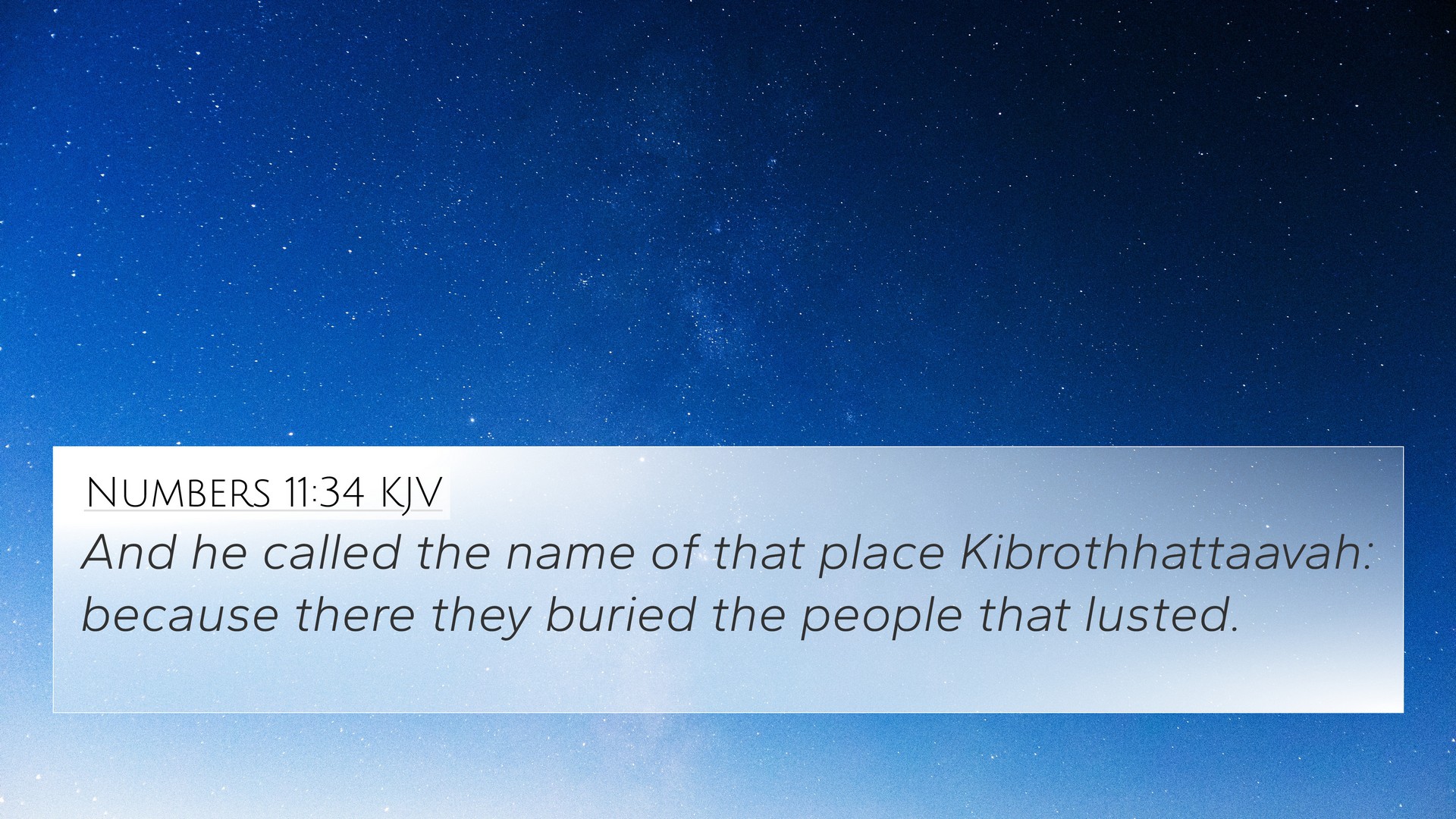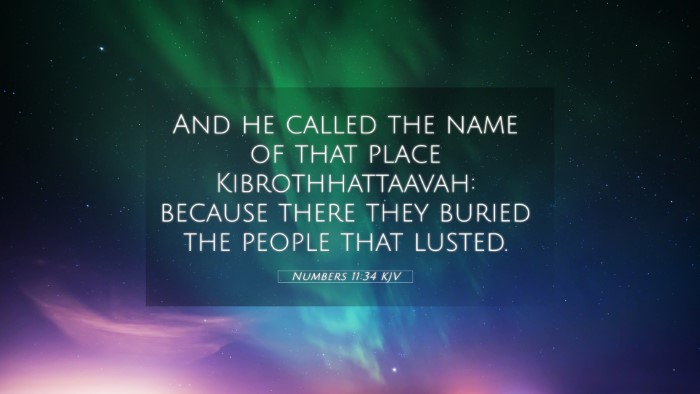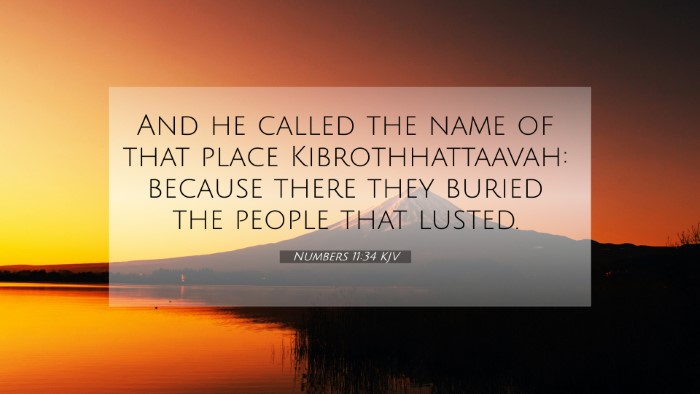Understanding Numbers 11:34
Bible Verse: Numbers 11:34 - "And the name of that place was called Kibroth-hattaavah, because there they buried the people that lusted."
Context and Overview
In the book of Numbers, the Israelite community finds itself in the wilderness, journeying towards the Promised Land. The incident surrounding Numbers 11:34 occurs during a time of discontent and turmoil among the people. Their complaints and cravings for food lead to divine punishment, highlighting the serious consequences of dissatisfaction and rebellion against God.
Commentary Insights
Matthew Henry Commentary
Matthew Henry emphasizes the gravity of the Israelites' complaints regarding their sustenance. He observes that the name "Kibroth-hattaavah," which translates to “graves of lust,” symbolizes the dire outcome of their cravings—leading to death and judgment. Henry points out that this place serves as a reminder of God's justice, contrasting human desires with divine will.
Albert Barnes' Notes on the Bible
Barnes notes that the term "lusted" reflects a deeper spiritual failure among the Israelites. Their yearning for the foods of Egypt exhibits a lack of faith in God's provision. The burial of those who succumbed to their desires signifies a serious warning regarding the dangers of disobedience and the importance of relying on God for sustenance, both physically and spiritually.
Adam Clarke's Commentary
Clarke draws attention to the historical significance of Kibroth-hattaavah, linking it to spiritual implications. He indicates that the burial of those who lusted showcases God's disfavor towards their lack of gratitude and trust. Clarke also discusses the importance of remembering this event as a cautionary tale that illustrates the balance between human free will and divine authority.
Thematic Connections
This verse can be examined through various inter-Biblical dialogues and thematic connections that highlight the consequences of human desire and lack of faith. Here are some relevant cross-references:
- Psalms 106:14-15: "But lusted exceedingly in the wilderness, and tempted God in the desert. And He gave them their request; but sent leanness into their soul."
- 1 Corinthians 10:6: "Now these things were our examples, to the intent we should not lust after evil things, as they also lusted."
- Hebrews 3:17: "But with whom was He grieved forty years? Was it not with them that had sinned, whose carcasses fell in the wilderness?"
- Philippians 3:19: "Whose end is destruction, whose God is their belly, and whose glory is in their shame, who mind earthly things."
- James 1:14-15: "But every man is tempted, when he is drawn away of his own lust, and enticed. Then when lust hath conceived, it bringeth forth sin: and sin, when it is finished, bringeth forth death."
- Exodus 16:3: "And the children of Israel said unto them, Would to God we had died by the hand of the Lord in the land of Egypt, when we sat by the flesh pots, and when we did eat bread to the full; for ye have brought us forth into this wilderness, to kill this whole assembly with hunger."
- Romans 1:24: "Wherefore God also gave them up to uncleanness through the lusts of their own hearts, to dishonor their own bodies between themselves."
Applications and Lessons
From Numbers 11:34 and the related scriptures, several key applications and lessons can be derived:
- The danger of dissatisfaction: The complaints of the Israelites serve as a warning against allowing our desires to overshadow our gratitude for God's provision.
- Trust in divine sustenance: Believers are reminded to trust in God's ability to provide for their needs, rather than succumbing to earthly cravings.
- The consequences of rebellion: This passage illustrates that rebellion against God can lead to serious repercussions, both individually and communally.
- Importance of remembrance: Reflecting on this event encourages believers to recognize God's past faithfulness and avoid the pitfalls of disobedience.
Cross-Referencing Biblical Texts
For those interested in deeper study, utilizing tools for Bible cross-referencing can reveal complex relationships between various scriptures. Some effective methods and resources include:
- Bible concordance: A tool that allows users to locate various scriptures based on keywords and themes.
- Cross-reference Bible study: Engaging in studies that connect multiple scriptures pertaining to common themes, such as obedience and satisfaction in God.
- Bible reference resources: Utilizing various printed and digital resources to navigate inter-Biblical themes.
- Comprehensive Bible cross-reference materials: Seeking comprehensive studies that provide detailed analyses of scriptural connections can deepen understanding.
Conclusion
Numbers 11:34 embodies profound themes of desire, judgment, and the need for reliance on God. Through comparative Bible verse analysis and thematic connections, this verse can be understood within a broader biblical context. Believers are encouraged to engage in scriptural cross-referencing to foster a rich understanding and appreciation of God's word and his expectations for his people.





